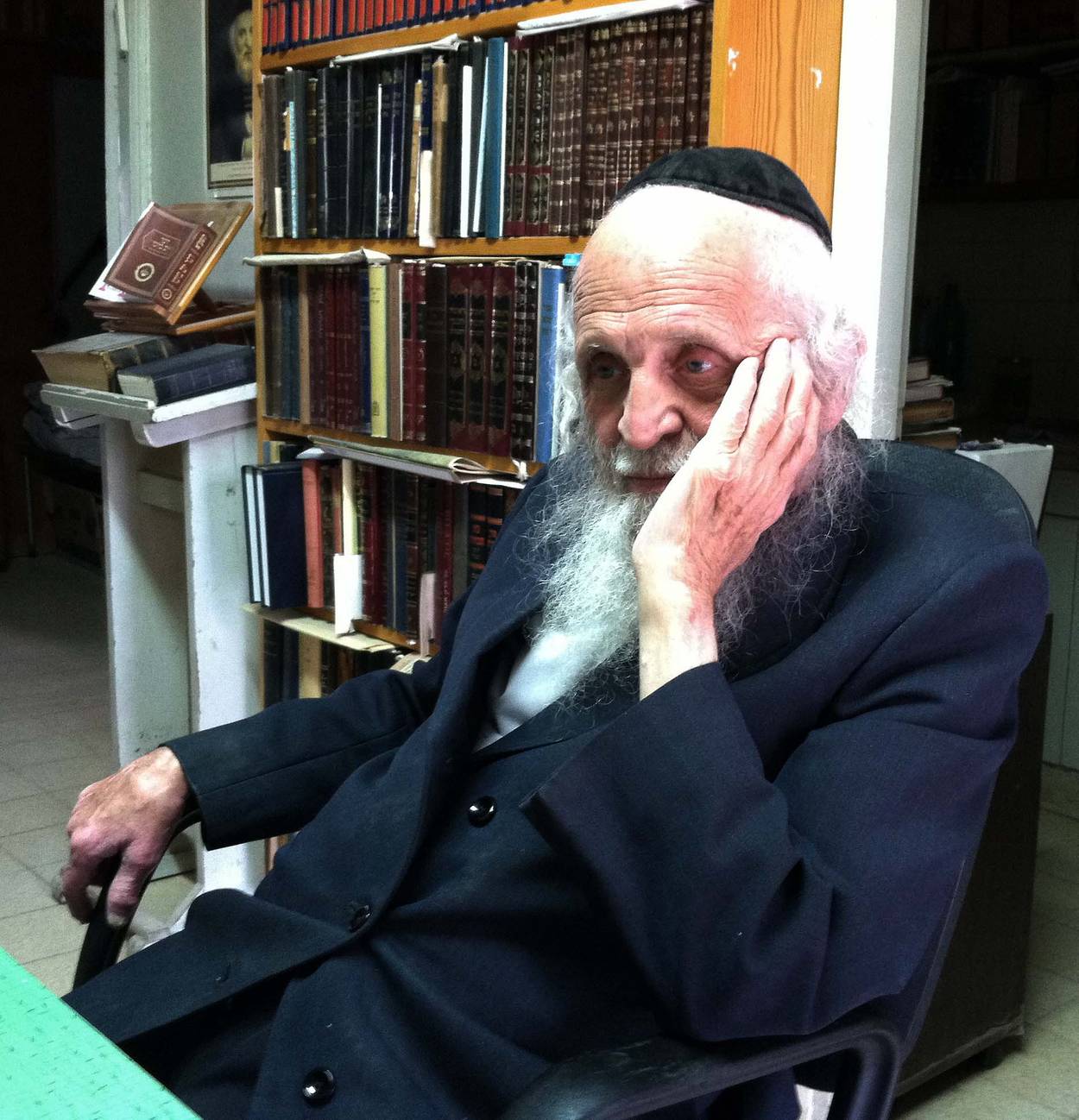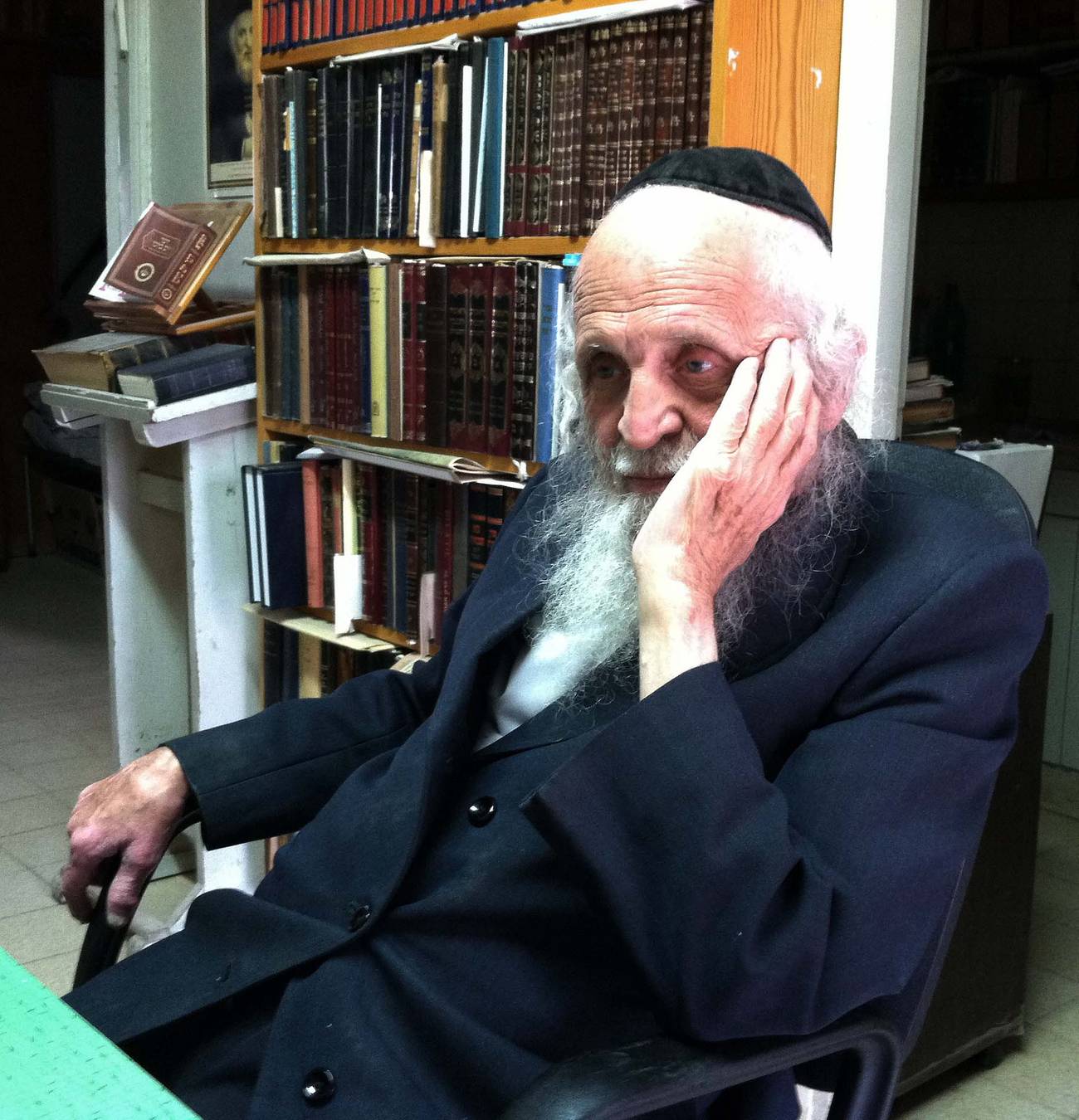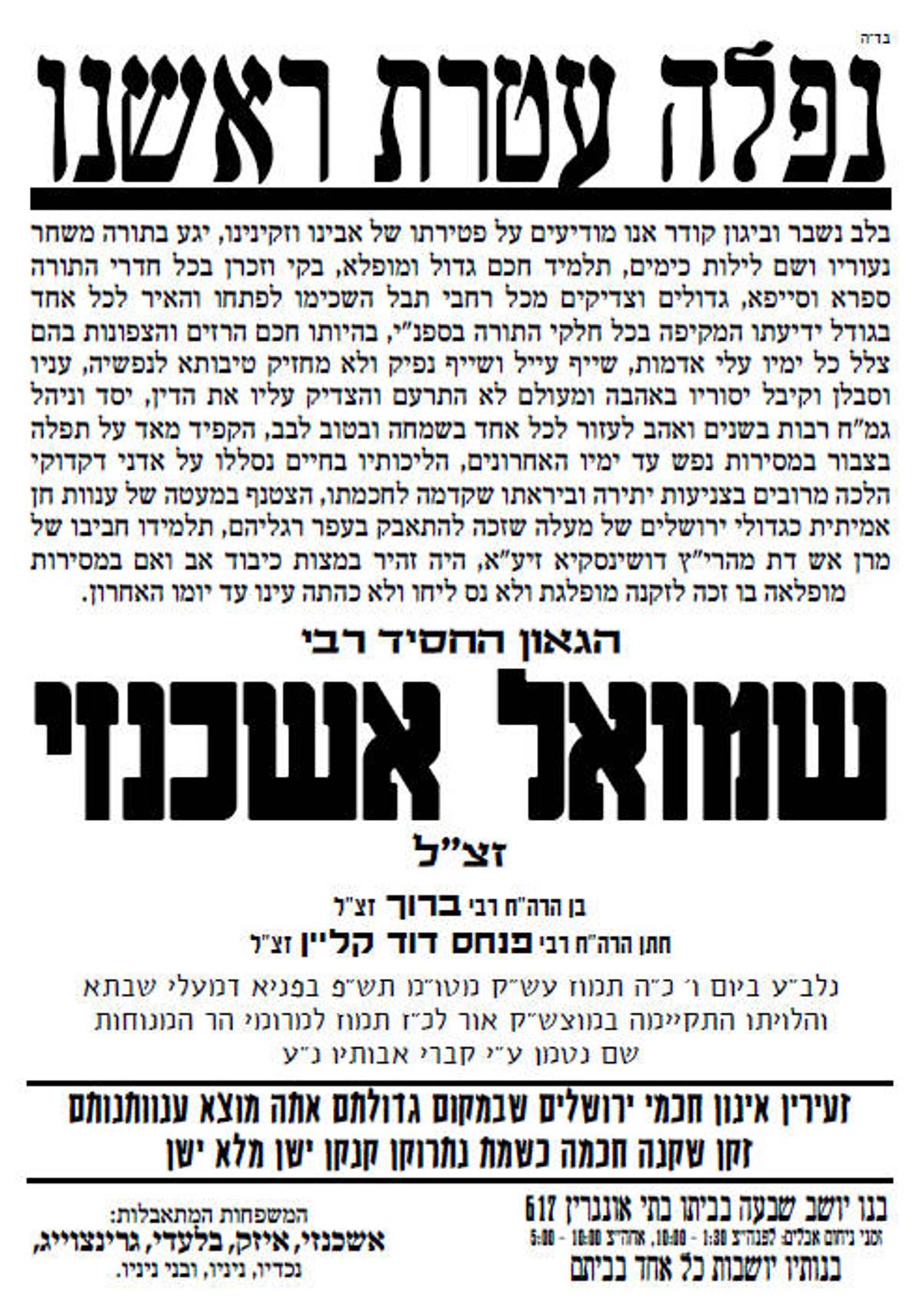In Memory of Shmuel Ashkenazi, Bibliographer of the Hebrew Book
The great book lover, who died of COVID-19 in Jerusalem on Friday, sends in his final correction




Rabbi Shmuel Ashkenazi, the Meah Shearim scholar whose pathbreaking research in the field of bibliography expanded the Jewish scholarly field during his eight-decade career, all the while assisting leading academic scholars of Jerusalem, died of complications from COVID-19 on Friday, and was buried on Saturday night in Jerusalem. He was 98.
Born in Jerusalem and educated as a devoted disciple of Rabbi Yosef Tzvi Dushinsky of the Edah HaChareidis, the stringent religious sect, Shmuel Ashkenazi (ne Deutsch) began to publish articles in every major (and minor) journal and forum of Torah scholarship from the age of 18 in 1940, continuing until his death. He was a fierce reader; he read every single literary newspaper and magazine in Israel. He was renowned for regularly sending correction letters to the editor, which would then lead to correspondence with individual authors, which in turn established lifelong friendships.
From this point and throughout his career, Reb Shmuel regularly prepared bibliographies of the leading scholars of his day, appearing in the pages of their memorial volumes, and all of the leading scholarly and traditional rabbinic journals regularly included his bibliographical essays, with their titles ranging from “A Collection of Initials and Abbreviations” and “Errors in Books,” to pieces on such niche topics as “Maimonides as a Translator from Talmudic Aramaic to Mishnaic Hebrew” and “‘Adventure’ of a Non-Existent Passage in the Talmud Yerushalmi.” These are among the hundreds of articles and reviews published during his lifetime.
During the late 1940s, he wrote dozens of entries in Mordechai Margaliot’s multivolume Encyclopedia of the History of the Great Men of Israel (1946-1950), as well as entries in the Encyclopedia Hebraica and other encyclopedias that were issued from the Masada Publishing House. He served as an editor of rabbinic works at the Mosad ha-Rav Kook. The following decade, working on behalf of Rabbi Menachem Kasher, he edited the Kasher Passover Haggadah (1960), which has been praised as one of the most important scholarly editions of the Passover Haggadah ever published.
In 1959, he published a small volume of 660 questions and answers filled with trivia related to biblical passages; several years later, in 1963, came a collection of more than 500 Yiddish proverbs and commentary. Two years later, in 1965, Reb Shmuel, together with Dov Yarden, published a Thesaurus of Hebrew Abbreviations, which Reb Shmuel followed six years later with a compendium edition of 4,000 abbreviations, which had been overlooked in the earlier edition. In 1967, Reb Shmuel published a monograph-length review essay of the Even-Shoshan Dictionary of the Hebrew Language. His review of the definitive tome appeared on the pages of several issues of the Academy of the Hebrew Language journal Leshonenu. His analysis, criticisms, and praise of the work remain a model for how to review linguistic scholarship; and his corrections were later incorporated into subsequent editions. In 1969, Reb Shmuel co-edited the classic Thesaurus of Proverbs and Parables from Medieval Jewish Literature by the late professor Israel Davidson of the Jewish Theological Seminary, who had died 30 years earlier. From the early 1960s until the 1980s, Reb Shmuel edited a new edition of the monumental Talmudic encyclopedia Pahad Yitzhak, by the 18th-century Ferrara-born Italian rabbi and encyclopedist, Isaac Lampronti, reissued by the Mosad ha-Rav Kook publishing house in Jerusalem.

But the impact of his scholarship cannot be appraised in his hundreds of publications alone. He saw himself as a resident of the Republic of Hebrew Letters, that space where intellectual discourse and conversation exists beyond physical limits, and in scholarly settings and publications. He was always available to assist scholars with their research.
From 1967 until his retirement decades later, Reb Shmuel worked at the Institute for Hebrew Bibliography at the National Library in Jerusalem, where he launched their project the Bibliography of the Hebrew Book. His mandate was to establish a “national bibliography of the Jewish people; and detailed description of all Jewish literature printed in Hebrew characters, for all types and in all languages. The bibliography includes most of the books, pamphlets and magazines printed in Hebrew, Yiddish, Ladino, Judeo-Arabic, and other Jewish languages, found in collections in Israel and abroad, starting from the beginning of Hebrew printing (in 1460 or so) through 1960.” In 1994, the Institute for Hebrew Bibliography released their first edition of the Bibliography of the Hebrew Book, which continues to be updated by the National Library of Israel.
Even after his retirement from the National Library, Reb Shmuel would visit the library each Tuesday and meet with scholars—young and old—and was available to assist with whatever research question. Nearly 20 years ago, in recognition of his contributions to the study of Hebrew language books and manuscripts, Reb Shmuel was appointed as an honorary board member of the prestigious literary society Mekizei Nirdamim (literally, “Rousers of Those Who Slumber”), founded in the 1860s in Eastern Prussia, moved to Berlin in 1884, and then to Jerusalem in 1934, where it continues the mandate to publish Hebrew books and manuscripts that had never been published or have been long out of print.
Over the past two decades, a circle of his students—among whom are several of my close colleagues in Jerusalem—began to regularly sit with him, going through every book in his home library. They would peruse each book, study every relevant page of marginalia, and study the notes and prepare mini-essays of his writings. (Reb Shmuel only used a typewriter; he never used the internet or even a computer.) The result was (to date) a series of three volumes, nearly 2,000 pages, composed of hundreds of chapters that each trace the development of Jewish customs and laws, and provide the sources to rabbinic expressions, popular proverbs, and obscure Jewish sayings. In each entry Reb Shmuel would proceed in his inquiry into a study of an anecdote that was recorded in a contemporary book or newspaper—and by contemporary, he meant anything from 1940 until today. He would show its development throughout the wide expanse of Jewish history and literature. Everything that he wrote was woven with his rich bibliographic knowledge, including his corrections to whatever authors had previously written. Everything that he wrote represented an encyclopedialike gathering of information on thousands of topics culled from thousands of Hebrew books, many very rare or unknown.
Nearly a decade ago, I had the opportunity to meet Reb Shmuel, when I was brought to his home in Batei Ungarin, in the Meah Shearim neighborhood of Jerusalem. As soon as I entered, I was overwhelmed by the floor-to-ceiling bookcases. I had heard that Reb Shmuel had the policy to purchase a new book every single day from when he turned 18, which he would then not only read, but heavily annotate and often review in print and more often than not, would establish a correspondence with the author.
Following our meeting, I joined an effort to raise funds for the publication of his works. As part of my efforts in this project, I embarked on a reconnaissance mission to speak with those leading academicians in Jerusalem (and around the world) who might have interacted with Reb Shmuel during the course of their work. Lucky for me, it was not difficult.
As noted in a testimonial by professor Sid Leiman of New York, Reb Shmuel was “bibliographer, bibliophile, and book collector, and his encyclopedic knowledge of all of Hebrew and Yiddish literature remains unparalleled in our time.” His collected writings are an intellectual treasure trove, “covering a wide range of topics in the field of Jewish Studies. Aside from his scholarly distinction, R. Shmuel Ashkenazi wrote in an elegant Hebrew with its own special charm. Not only did he advance discussion, but he did so in an aesthetically pleasing manner. For those of us who knew him personally, he evinced the same charm in his personal relationships that he did in his writings.” Of our project to publish Reb Shmuel’s writings, Leiman wrote to us: “Let it be said openly: this three-volume set will enlighten every reader and will significantly advance scholarship. Anyone concerned with advancing the cause of quality Jewish scholarship will take special delight in the publication of these volumes.”
About the range of Ashkenazi’s correspondences, Leiman wrote:
During his lifetime [Ashkenazi] corresponded with the greatest Jewish scholars and bibliographers the world over. They wrote to him, for only he could solve the countless historical and literary problems that stumped them. Suffice to list among those who consulted him: Gershom Scholem (distinguished Jewish historian); S.Y. Agnon (Nobel Prize laureate); Judah Leib Maimon Fishman (Minister of Religions, Israel); and a stellar list of prominent Jewish historians, rabbinic scholars, and bibliographers, much too long to list here (e.g., Simha Assaf; Israel Ta-Shma; Meir Benayahu; A.M. Habermann; Avraham Yaari; and Naftali Ben Menahem).
To date, several volumes have appeared, with funding being the only cause for the delay in the publication of the next two volumes of his scholarly correspondences. Following Reb Shmuel’s passing this weekend, our group reconvened and recommitted ourselves to bringing the two-volume epistolary collection of his Hebrew letters with dozens of leading scholars and rabbis (some of whom are named above) to its publication. We are sending the manuscript of some 950 letters in Hebrew, fully annotated, covering nearly 1,000 pages, to press this week, and it will be published in print by the end of the 30-day period of mourning for Reb Shmuel.
Former editor of Mekizei Nirdamim’s journal Kobez Al Yad, Shulamit Elizur, a professor at the Hebrew University of Jerusalem, once wrote to me about Reb Shmuel:
I am unequal to the task of adequately singing the praises of Rabbi Shmuel Ashkenazi, an erudite bibliophile. His familiarity with rabbinic writings from throughout Jewish history is unparalleled, and he is well-versed in the research literature of academic Jewish studies as well. I first met Rabbi Shmuel Ashkenazi through my teacher, the late Professor Ezra Fleischer. Prof. Fleischer, who was one of the greatest scholars of all time, would often chat with Rabbi Ashkenazi on scholarly topics, and he was careful to send Ashkenazi every article or book he published, knowing that in return he would receive enlightening comments on his work. When I began my own research, Prof. Fleischer instructed me in turn to send my publications to Rabbi Ashkenazi, and I too was privileged to learn a great deal from his comments. It once happened that I was searching for a particular midrashic theme which was alluded to in a liturgical poem (piyut), and although I consulted the leading scholars of Jerusalem who responded that it was a wellknown homily, I was unable to locate its specific source. In my hour of need, I turned to Rabbi Ashkenazi, who immediately gave me several references. It emerged that every one of these references postdated the piyut by almost a thousand years, and that this ancient tradition alluded to in the poem had been transmitted orally for that long period before being committed to writing in the later midrashim. Rabbi Shmuel Ashkenazi’s correspondence is a tremendous resource of Torah and scholarship. Every paragraph encapsulates a great deal in just a few words, and sometimes even with allusions whose explication require deep learning. The admirers of Rabbi Ashkenazi are doing a great service to the scholarly community by publishing his letters, and this project is richly deserving of support. I hope that the editors of the volume will add short explanations to Rabbi Ashkenazi’s brief allusions. The value of the book will be particularly enhanced if they include detailed indices to guide scholars to the many pearls of wisdom hidden within it that might easily escape the eyes of most readers.
Also from the Hebrew University of Jerusalem, professor Chava Turniansky, the great scholar of Yiddish literature and translator of the Memoirs of Glikl, wrote to me:
Many years ago, when I was studying towards my PhD in the Yiddish department at the Hebrew University, I had the privilege of making the acquaintance of Rabbi Shmuel Ashkenazi at the National Library in Jerusalem, where he was then employed as a researcher for the Hebrew Bibliography Project. From our first conversation, which began with a question that I asked and which he answered, he followed my studies and research for many years. Until that day I had never met, and I have not met in the subsequent thirty-five years, a greater Talmid Hakham than Rabbi Ashkenazi. His total command of Jewish sources, ancient and modern, and their commentaries, his knowledge of tradition and ritual, of Jewish life throughout the ages, and his deep familiarity with the intricacies of Yiddish literature make him unique. His wide and deep knowledge (leading me and others to refer to him as a walking encyclopedia) is accompanied by rare generosity, a constant willingness to share his knowledge with others, to teach and explain, enlighten and edify, and always with warmth and a welcoming smile. His books give articulate testimony to his generous nature. They reveal unknown worlds, they guide and teach with exemplary clarity, demonstrating to the reader the importance of accuracy and care, encouraging him or her to stick to the text in order to avoid errors. His sage comments on innumerable books do the same, remaining faithful to the text and explicating it fully. For many researchers in the field of Jewish studies, Rabbi Shmuel Ashkenazi’s books sit on the closest bookshelf, and they travel from there to the work desk on a regular basis. I cannot calculate how much Reb Shmuel has taught me (and continues to do so, through his books). No less important, and perhaps more so: he taught me how to learn, how to ask questions of the text and how to search it for the answers. His scholarship accompanies my research constantly, and if my own works have achieved some success, he has a significant portion in that success.
Professor Zeev Gries, a leading scholar of the history of Jewish bibliography and author of The Book in the Jewish World, 1700-1900 (2007), wrote to me:
I was a PhD candidate who published his first article on “The Editing of Zava’at haRivash,” in Kiryat Sefer, when Reb Shmuel met me, near the entrance to the Judaica reading room of the National Library in Jerusalem. He introduced himself and said he read my article and has several comments on it. I did not know him then, but as an employee of The Hebrew Bibliography Project, and was surprised to find behind his corrections and comments a great scholar, who mastered the history of the Jewish book and its content, in manuscript form, as well as in a printed form, as no one else I knew among my teachers and peers. I did not know at this meeting how much I had to feel flattered by the humble additional wish he expressed: “Please let me read whatever you write.” My face was marked with an impression: “It is not to be true,” since my experience was that very few scholars I knew in the academic world, would have made such a generous offer to a young student. Reb Shmuel laughed and said: “You would not believe it, but professors such as Israel TaShma and others stand in line waiting for my comments on their articles and books.” In other words he ensured the nonbeliever of his unique stature among famous scholars, of which at that time I knew nothing, in order to convince me he is serious, and really wishes to read the writings of an unknown PhD candidate. Since that very meeting I was blessed and had almost every article or book given to Reb Shmuel, returned to me with corrections and comments, on the manuscript. These comments and corrections were always the best I could dream of, helping my expertise on the history of the Jewish book, reach the cutting edge of the field. … Now at an old age when Reb Shmuel is hard pressed to walk far out of his home in Batei Ungarin in Jerusalem, we all should help him collect all his writings and publish it, including the many letters written through the years. These letters are but part of a great treasure we must keep for us and for generations to come.
Without the use of a computer, Reb Shmuel gained his full knowledge of Jewish history and literature by reading its written word in the thousands of books that he studied and knew so well, but also by talking with mentors from his childhood, colleagues throughout his life, and learning from his students. On that day nearly a decade ago at his home in Jerusalem, I asked permission to sit at his desk and strike a few keys on his typewriter, the very system that he used to share his knowledge with the world, and felt an even deeper connection to Reb Shmuel and his literary output.
The great Jewish bibliophile and scholar was active until his final days, working on his research and writing and on the preparation of his upcoming works. If we are to take the traditional well-wish of biz hundert un tsvantsik (“to 120”) quite literally, that would mean that Reb Shmuel had at least another 20 years of writing in him. It is up to us to continue his legacy.
Menachem Butler, an associate editor at Tablet Magazine, is the program fellow for Jewish Law Projects at the Julis-Rabinowitz Program on Jewish and Israeli Law at the Harvard Law School, and a co-editor at the Seforim blog. Follow him on Twitter @MyShtender.